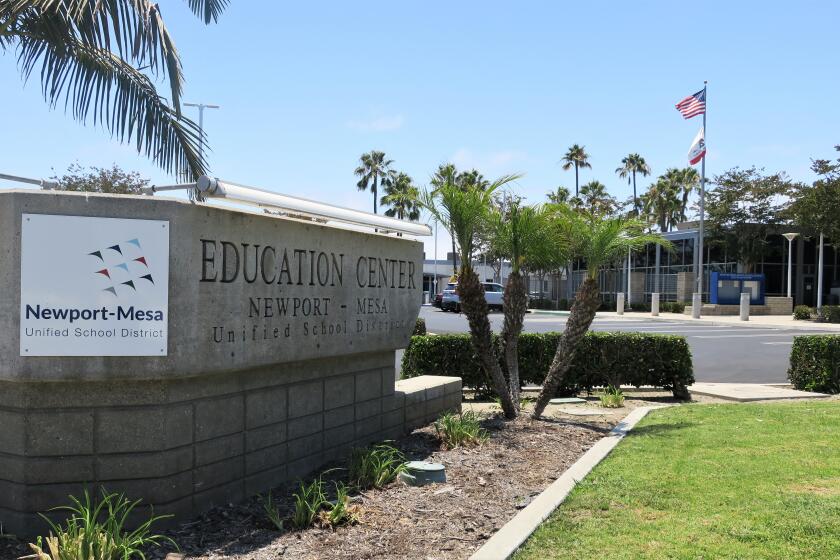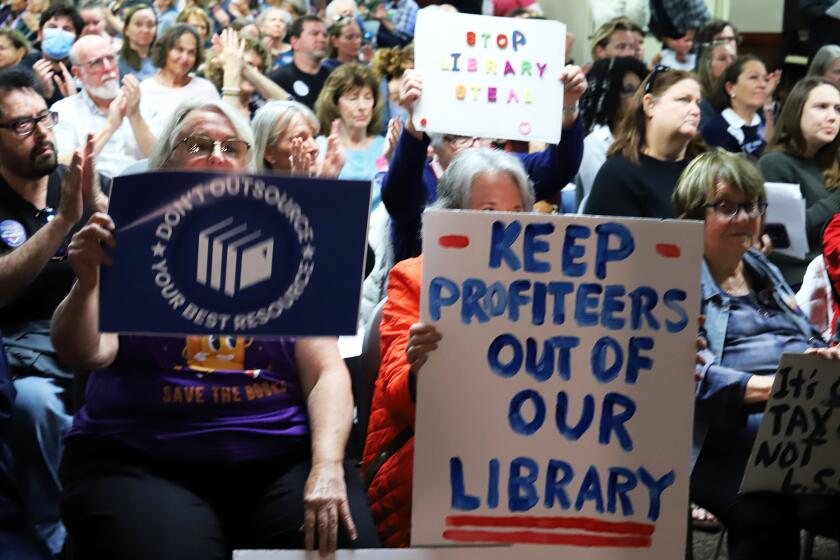Column: College admissions scandal should lead to the examination of an elitist culture

- Share via
Like most people, I seethed with indignation when I learned about the college admissions scam factory, which authorities say utilized bribes and deception to finagle coveted acceptances for wealthy kids.
Even so, I couldn’t help snickering when I came across this headline: “College admissions, rigged for the rich.”
That painfully obvious gem ranked right up there with such classics as:
“Jobs remain the best insurance against unemployment.” “High fat, high sugar diet may fuel weight gain, study finds.” “Rally against apathy draws small crowd.”
What the story title should have said, or perhaps what it meant to imply, is that the college admissions process, which already favors the affluent, is even worse than we thought. It’s not just unfair; in some cases laws might have been broken.
It’s certainly understandable that we would be incensed by fraudulent activities carried out by Newport Beach-based college admissions consultant William “Rick” Singer. And don’t even get me started on his clients, who might consider selling their jewel-encrusted “World’s Best Mom” mug collections to help pay for their legal fees and years of therapy for their kids.
However, I also think we should reserve a bit of our outrage for some of the “victims” of the alleged criminal activity: the institutions of higher education.
The universities that parents allegedly bribed and cheated their kids into — including my alma mater, UCLA, as well as USC, Yale, Georgetown and other so-called “elite” institutions — were quick to respond after news of the scandal broke. They fired employees accused of participating in the alleged deception and promised thorough investigations. Some students would likely lose their spots, they said.
They appeared shocked — shocked! — by the fouling of the integrity of the college admissions process. Many noted the efforts they’ve taken to increase diversity and to identify and admit promising students of lesser means. See, they’re really good guys, just trying to do the right thing and they got suckered too.
Oh, please.
To be clear, I do not think that these institutions participated in criminal activity, although it’s worrisome that such brazen schemes were allegedly carried out right under the noses of administration officials.
But I do blame the schools for fostering an unhealthy environment — one in which corruption might have have appeared to some ethically challenged individuals to be the next logical step in an already-compromised system.
These universities have for years poured enormous efforts into cultivating and marketing their hoity-toity images, their air of exclusivity and unparalleled excellence. We are the “best” schools, and only the “best” students are invited to share in the luster of our awesomeness, they suggest.
At the same time that they are promoting these facades of ivory tower perfection, they are also encouraging as many students as possible to apply. You just never know, they tell kids. We look at the whole person and carefully review every application, looking for talent, potential and tenacity.
They do this knowing full well that many kids they accept have a built-in edge due to wealth, connections or athletic gifts and as a result the number of spots available for those without such advantages is even smaller. The schools benefit from — and shamelessly promote it when — they have high or record levels of applications.
The more applications, the lower the acceptance rate. The lower the acceptance rate, the higher the school’s ranking. The higher the school’s ranking, the greater its claim of “elite” status.
And it’s this notion that certain institutions are elite that is at the heart of a very big problem in education. We say we want every student to have equal access to a quality education, but too many kids obviously don’t.
We tell them if they work hard they can overcome disadvantages. But then we erect more obstacles.
We dangle the prospect of being invited the join the “elite” — I really wish we’d wipe that word from our lexicon — while showing insufficient respect for students who take a different route. We need to celebrate the kids that work their way through community colleges, state schools and less well-known institutions, and reward the ones who that apply themselves and earn every bit of the degrees they obtain through their own initiative.
As we look to assign responsibility for a noxious college-admissions environment, we also shouldn’t forget the out sized influence we assign to standardized tests, which are also tilted in favor of students from privileged backgrounds.
These tests are often of dubious educational merit, yet they are crucial to the college admissions game. And they are yet another way for universities to boast of their superiority. We’re so great, they imply, because our students have high scores on an otherwise meaningless test.
Is it really so surprising if some wealthy parents might have crossed the line from exploiting the advantages of the privileged to outright cheating on their kids’ SAT and ACT tests?
I suspect we will learn more about the extent of alleged wrongdoing as the scandal unfolds. But my hope is that we don’t see this as an isolated case and instead use it as an opportunity to examine college admissions generally and the elitist culture that it feeds.
The process will always favor some, but we can and must do better.
Patrice Apodaca is a former Los Angeles Times staff writer, and is the coauthor of “A Boy Named Courage: A Surgeon’s Memoir of Apartheid.” She lives in Newport Beach.
All the latest on Orange County from Orange County.
Get our free TimesOC newsletter.
You may occasionally receive promotional content from the Daily Pilot.




